By Richard Skanse
“Don’t you love this place?”
Those were the first words Robyn Ludwick said to me the first time I ever interviewed her. The place in question was the Devil’s Backbone Tavern in Fischer, Texas, perched at the edge of a steep limestone ridge just a few miles up FM 32 from the singer-songwriter’s house in Wimberley. We were meeting to discuss her new-at-the-time fourth album, 2014’s Little Rain, but for the first several minutes Ludwick was far more interested in feeding cash into the classic country-loaded juke box and showing off her favorite “haunt” like a hyper-enthused tour guide.
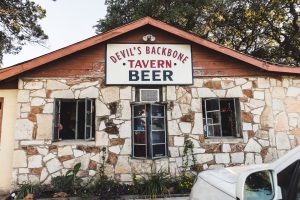
The Devil’s Backbone Tavern in Fischer, Texas. (Photo by Robbyn Dodd)
“Check this out,” she said, cracking a door to the right of the shuffleboard table to reveal a large adjoining room full of boxes, retired neon beer signs and all manner of other cobweb-crusted hoarder’s detritus. But Ludwick saw something more, hiding in plain sight: the ghost of a “gorgeous” old dancehall just needing a little TLC to bring it back from the dead.
“This is the coolest part of the bar, but it’s been closed forever,” she sighed. “I really wish somebody would do with something with it …”
Fast forward to the present, and Ludwick’s wish has come true. And to think all it took was a small matter of rolling up her sleeves and doing it herself — well, along with her husband/bass player John “Lunchmeat” Ludwick and longtime friend Abbey Road.
On Aug. 20, the Ludwicks and Road officially became the proud new owners of the Devil’s Backbone Tavern. And they’re not just leasing the building, either, as the bar’s previous proprietors, Helen and Rick Ferguson (and others before them) had for decades; they bought the whole damn place — along with the two acres of rugged and supposedly haunted Hill Country property (the site of an old Indian campground) on which it’s stood for nearly a century. “Our kids think we’ve lost our minds,” Ludwick says, with a little laugh suggesting she’s half inclined to agree with them.
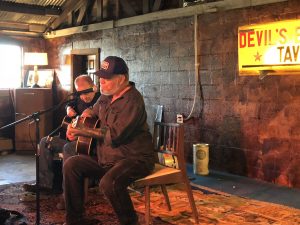
Jon Dee Graham and Mike Hardwick playing the first “Devil’s Revival” Sunday on Oct. 21. (Photo by Richard Skanse)
It’s Sunday, Oct. 21, and she’s a few minutes from joining Lunchmeat and the rest of her band onstage to kick off the day’s “Devil’s Revival” festivities, an afternoon of free live music which will also feature an acoustic set by gravel-voiced Austin legend Jon Dee Graham. With myriad little management-level details/worries on her mind at the moment (like the parking situation outside and whether or not they’ve got enough Lone Star Light on hand to get them through the day), doubtless she’s eager to just strap on a guitar and play: Not just for the thrill of breaking in her own dancehall, but because that 40 minutes or so performing in front of an audience will likely be her first chance to actually “relax” in months.
“I love hard labor, and I’ve always loved doing everything myself and learning new things,” she says after her set, alluding to her and her husband’s other passion-project side gig, restoring vintage AirStream trailers as vacation rental homes. “But going into this … (laughs) I didn’t know the first thing about running a dancehall and bar!”
Indeed, while their business partner Road came onboard with a fair bit of relevant operations know-how, gleaned from years of booking Luckenbach, Threadgill’s and, most recently, the Old Coupland Inn and Dance Hall (which she bought and began restoring herself a year ago), the Ludwicks are having to learn this whole other side of the music business on the fly. But for all the stress and anxiety that’s entailed, it’s above all been a true labor of love. Robyn says that the Devil’s Backbone has been one of couple’s favorite local hangs for as long as they’ve lived in Wimberley (20 years), and her own fondness for the tavern goes back even further. She recalls first going there in her late teens, while visiting her older brother Bruce Robison when he lived in San Marcos. Coincidentally, that likely would have been right around the same time that a young Todd Snider stumbled upon the out-of-the-way watering hole himself while getting lost en-route to Luckenbach, a happy accident immortalized in his song “The Ballad of the Devil’s Backbone Tavern.” Clearly, there’s just something about a good dive bar hidden in the middle of the Texas Hill Country with history and character (not to mention a history of colorful characters) to spare that makes an unforgettable first impression on the singing-and-storytelling kind.
“John and I always said that if this place was ever for sale, we would try to do it,” Ludwick says, “so we always had that dream together.” Of course, when that opportunity actually presented itself just six months ago, her husband — “the realist” of the two of them, Robyn notes with a laugh — had his legitimate reservations: i.e., “We can’t do this! We have babies to feed!” Still, she had to at least try.
“As soon as I found out through the grapevine that the owner was thinking about selling,” she says, “I flipped out and went straight to the bar and said, ‘I have to have the owner’s phone number right now!’”
The owner was one Jerry Kubena, the 71-year-old grandson of the late Evelyn Meyer Kubena Dreier, who bought the property way back in the ’40s. The tavern was still relatively new back when Eveyln took it over, having opened in 1937 (right after Prohibition ended), but the first stone structure on the site — a still-standing little building right next to the bar — dates as far back as the 1890s, when it was erected as a blacksmith’s shop and stagecoach stop. It was the enterprising Eveyln who later added the dancehall, along with a filling station and general store, making it, in Ludwick’s words, “a one-stop shop where you could literally get your tire fixed, get a beer, and get your butt whipped, all at the same time.”
The gas station and store are long gone, and the tavern business eventually ended up being leased out to others. But the land and everything on it remained the property of the Kubena family for seven and a half decades, right up until Jerry decided to finally sell. Not surprisingly, he started getting offers before he even contacted a realtor. Knowing that other interested parties would likely be able to outbid her, Ludwick shot straight with him right from the start.
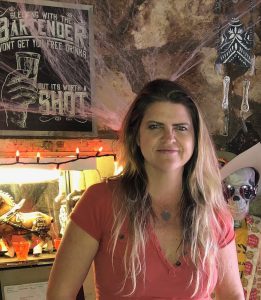
Devil’s Advocate: Co-owner Robyn Ludwick behind the bar with an old regular. (Photo by Richard Skanse)
“I introduced myself and told him my connection emotionally and professionally, I guess you would say, to the bar,” she says. She told him about her first visit to the tavern at age 17, and about how her brother Bruce later did a photoshoot there for his album, Wrapped. She talked about how the Devil’s Backbone reminded her of the old Bandera “beer joints” she practically grew up in while her mother tended bar, a honky-tonk raising that perhaps inevitably drove three of the Robison kids to a life of singing and songwriting. And of course she talked about how much she wanted to see the old dancehall put to good regular use again, just like she imagined it had been in its heyday under Evelyn, back when Jerry himself was just a kid.
“I told him that I really hoped that he cared about the legacy that his grandmother had created, even though it had kind of weaved in and out of its better days,” she says. “It had not been loved for a very long time, but I told him that I was the person that could bring it life again, and that I would really appreciate the chance to do that.”
Clearly, she made a good impression. Although Kubena already had bigger offers on the table, he told Ludwick he’d give her a week to figure out a plan for how to get enough money together. He kept his word, too — even after Ludwick ended up having to ask for an extension. Convincing her skeptical but supportive husband that they could do it — or rather, had to — was one thing; finding a sympathetic bank was quite another. “I’m a musician,” she laughs. “Nobody loans me money! I have a 2004 car — how am I going to have any kind of credentials to get a loan on a commercial business?”
Enter Abbey Road, who brought with her not just experience and a magic touch for reviving old dancehalls (“she worked her butt off for two years and took Coupland from karaoke to Tanya Tucker,” marvels Ludwick), but the “super hero” support of a silent fourth partner whose backing helped them seal the land deal. After that, the Ludwicks and Road still had to negotiate a separate deal to buy out the tavern business (“That was a whole other can of worms,” Robyn offers with a sigh), followed by months of hard work clearing out the dancehall and removing brush and rocks to make room for more parking behind the building. The bar was closed for a few weeks while they waited for their new TABC license, but the Devil’s Backbone Tavern officially reopened under its new management and ownership on Oct. 10.
Changes? Yeah, they’ve made a few. As some longtime regulars grumbled from the outset, the beer prices went up a smidge — though hardly enough to bump the humble dive bar up into the higher hipster dive bar tax bracket. More noticeably, it’s also now a non-smoking establishment, meaning those who do must now step outside to either one of the shaded picnic tables ’round back or puff away in the front parking lot overlooking one of the most stunning views in the Texas Hill Country. And while the bar is still cash-only, there’s now an ATM on the premises — along with a full liquor license, allowing those in the mood for something stronger than beer to partake in the harder stuff. There’s even a coctail menu of sorts, featuring the Devil’s’ own “Texas Jesus”: a triple-shot of Jack, Crown, and Jim Beam concocted as a toast to Ludwick’s hell-raising other songwriting brother, Charlie Robison.
Other than that, though, the “new” Devil’s Backbone Tavern looks and feels very much the same as it has for decades. Photos of old-timer regulars passed on still hang on the walls; the ceiling is still adorned with a small fortune in dollar bills (and bullet holes, if you know where to look); and the plumbing and sinks in the restrooms (located out back) still leave a lot to be desired. “We’ve had to do just enough to repair things that needed to be repaired while still keeping the coolness intact — because you don’t want to change any of that,” says Ludwick. “Locals want to see the same holes in the walls and the floor.”
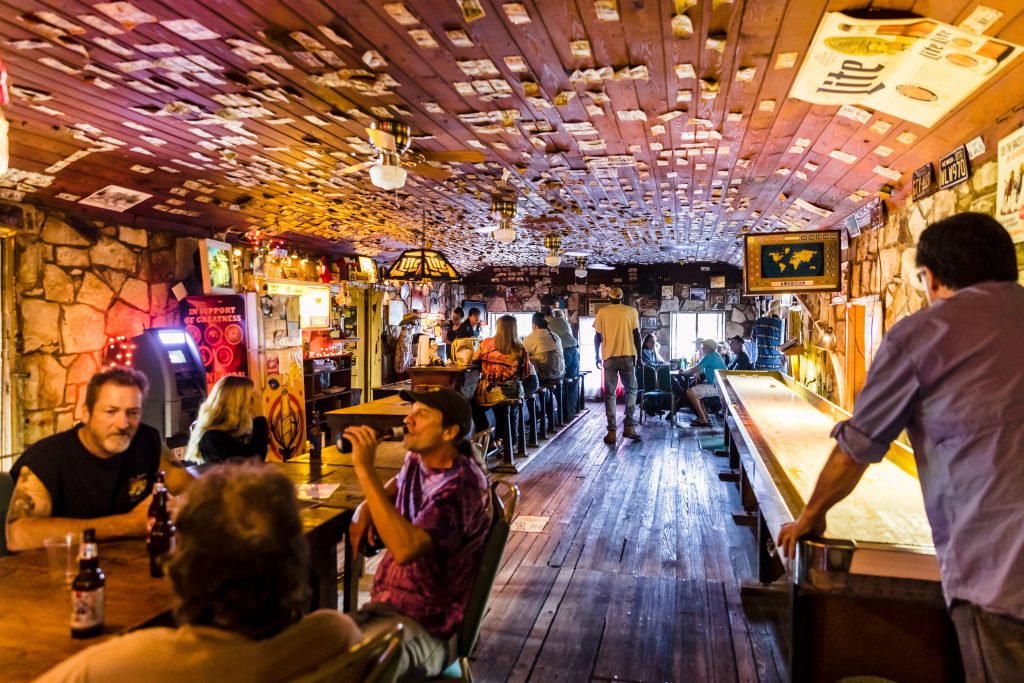
The more things change at the Devil’s Backbone Tavern, the more things stay the same. Anyone for shuffleboard? (Photo by Robbyn Dodd)
And it should go without saying that the familiar jukebox remains stocked with classic country and that the old shuffleboard table is still sanded up and ready for all takers, tying the whole room together from its prime spot along the wall opposite the bar. Securing both pieces from the previous proprietors apparenty took some finagling (and a bit more cash), but replacing them wasn’t really a viable option. “If people saw a different jukebox or shuffleboard table, there would be hell to pay,” Ludwick laughs. (Wednesday nights, by the way, are when the tavern hosts its weekly Sinner’s Shuffleboard Tourney.)
But of course, the Ludwicks and Road didn’t buy an old bar just for the sake of buying an old bar and to appease the shuffleboard set. The main goal from the get-go was getting that old dancehall up and running again, and it’s on that end of the building where the new team has really made its mark.
To be clear, the dancehall hadn’t gone completely dark in the decades since its mid-last-century heyday. In addition to hosting weekly open jam sessions in the tavern (a tradition that now continues every Thursday), the previous managers opened the larger room intermittently over the years for special events and even the occasional road show, including a sort of homecoming performance this past spring by the visiting Jeff Mix and the Songhearts. Mix, a songwriter and independent filmmaker based in Las Vegas, had previously shot part of his debut feature, Lost Vegas Hiway, at the Devil’s Backbone — a location suggested to him by none other than Robyn, one of a handful of Texas artists (along with Hal Ketchum, Jack Ingram, and Gurf Morlix) cast in the film. But when the Ludwicks caught that Songhearts show in March, just supporting a friend while enjoying a date night out, neither had any idea that a few short months later, they would be working overtime with Road to bring live music to the Devil’s Backbone Dancehall not just once in a blue moon, but every weekend.
It’s still very much a work in progress, but so far, so good. Although Robyn notes that it may be awhile before they can swing a new permanent p.a. system, the ancient, blown-out monitors that used to be mounted in the rafters above the stage have blissfully been retired in favor of superior sounding rental set-ups for every show. And they’ve already had quite a few — beginning not, as originally planned, with that Sunday afternoon, Jon Dee Graham-headlined “Devil’s Revival” grand opening celebration on Oct. 21, but rather the night before. Songwriters Michael O’Connor and Jeff Plankenhorn had been booked for a duo performance at the open air Fischer Haus Concert series just up the road, but heavy rains that week left the grounds there too muddy for parking. Naturally, the new Backbone owners were happy to help, but Ludwick admits it was a bit of a scramble pulling it off — and by no means a guaranteed success.
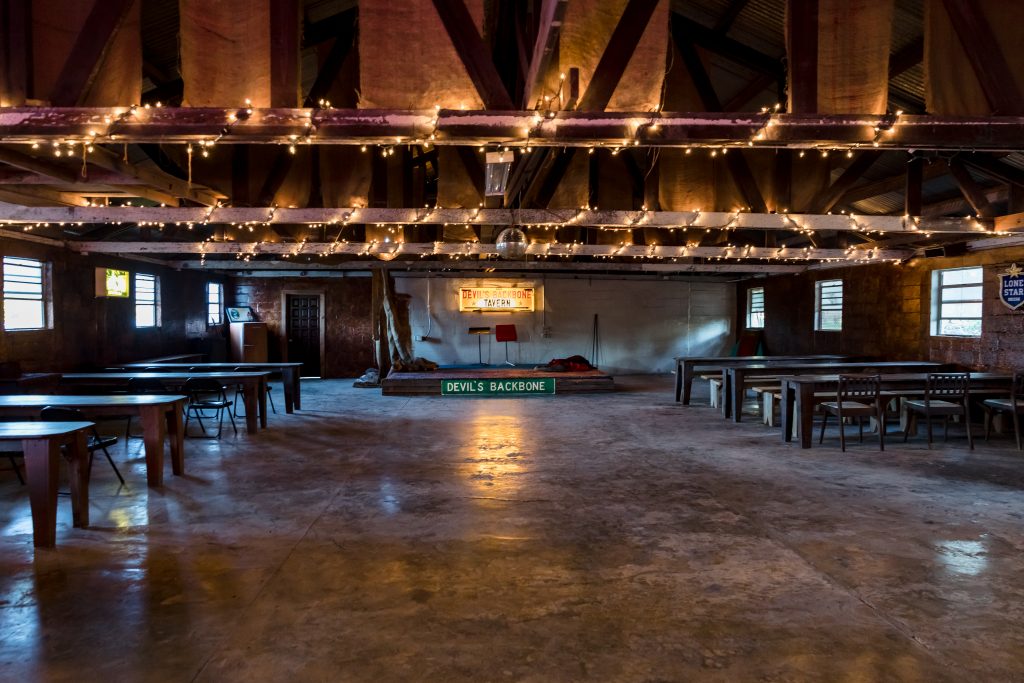
Just add music: The Devil’s own Dancehall. (Photo by Robbyn Dodd)
“We had less than two days notice, and as soon as the announcement was made, a lot of their RSVPs dropped out,” she says. Doubtless some Fischer Haus regulars were wary of the venue change from a family-friendly concert under the stars setting to an infamously (albeit no longer actually) smoky dive bar. But those who didn’t cancel were pleasantly surprised, and plenty more bought tickets at the door. “We ended up having about 150 people in the dancehall, with more hanging out in the tavern, so it turned out to be a really cool night,” reports Ludwick. Or, as O’Connor enthused after the show on Facebook: “Devil’s Backbone Tavern: Wow! There is a honky-tonk heaven!”
Since that first weekend of shows in October, the dancehall has hosted the John Evans Band, Tessy Lou Williams and the Shotgun Stars, Fingerpistol, Copper Chief, and Rosie Flores, with bookings through the end of the year and into January including Gary P. Nunn (Nov. 23), Two Tons of Steel (Dec. 7), Dalton Domino and John Baumann (Dec. 16), Dale Watson (Jan. 4), and Bill Kirchen (Jan. 20). And they’re just getting started. Give ’em a year, and the Devil’s Backbone could conceivably find itself ranked amongst the region’s most happening honky-tonks — whether longtime fans of the place like it or not.
“It’s kind of strange, really, but you know how places like Gruene Hall and Luckenbach have all this history where you can ask somebody anywhere and they’ve heard about them?” asks Robyn. “Well, the Backbone has its own incredible history, but it’s always been more like an underground bar and dancehall that only the people that ventured out to this area of the Hill Country would stumble upon. I mean, Todd Snider was looking for Luckenbach and got lost, found the tavern, and wrote that incredible song about it. And the way Todd found it is kind of the way everybody finds it: They kind of stumble upon it and then they’re like, ‘Oh my god, this is mine, I don’t want to tell anybody! I don’t want all the people coming here and messing this up!'”
Having long been exactly that kind of fan of the bar herself, Ludwick can’t help but laugh at the ironic position that puts her in now that the tavern actually is hers. But she’s just idealist enough to believe that a little good word of mouth to bring in newcomers needn’t impinge on the tavern’s character or appeal.
“From the very beginning, we’ve always asked ourselves, ‘what is the Backbone really about?’ Well, it’s about the hang. It’s about the haunt. And it’s about how you feel when you’re there with all your compadres,” she says. And going forward, it’ll be all about the music, too — just as Ludwick promised Jerry Kubena it would be when she first called him six months ago, pitching her case with more passion than capital but emboldened by the hunch that the late Evelyn Kubena had the same dream when she took over the Devil’s Backbone herself 70-odd years ago. After all, it’s not like she built the old dancehall just to give the ghosts more room to romp.
“There were five other people ready to put a contract on it, including a couple of other very prominent Texas musicians,” marvels Ludwick. “But luckily, Jerry really thought that I would be the best person to have it. And now he sends me messages all the time, saying, ‘My grandmother and father would be so happy right now.’
“I get emotional just thinking about it, because he actually cried,” she says after a pause, then busts out an incredulous laugh to check her own tears. “I made a 71-year-old man cry!”




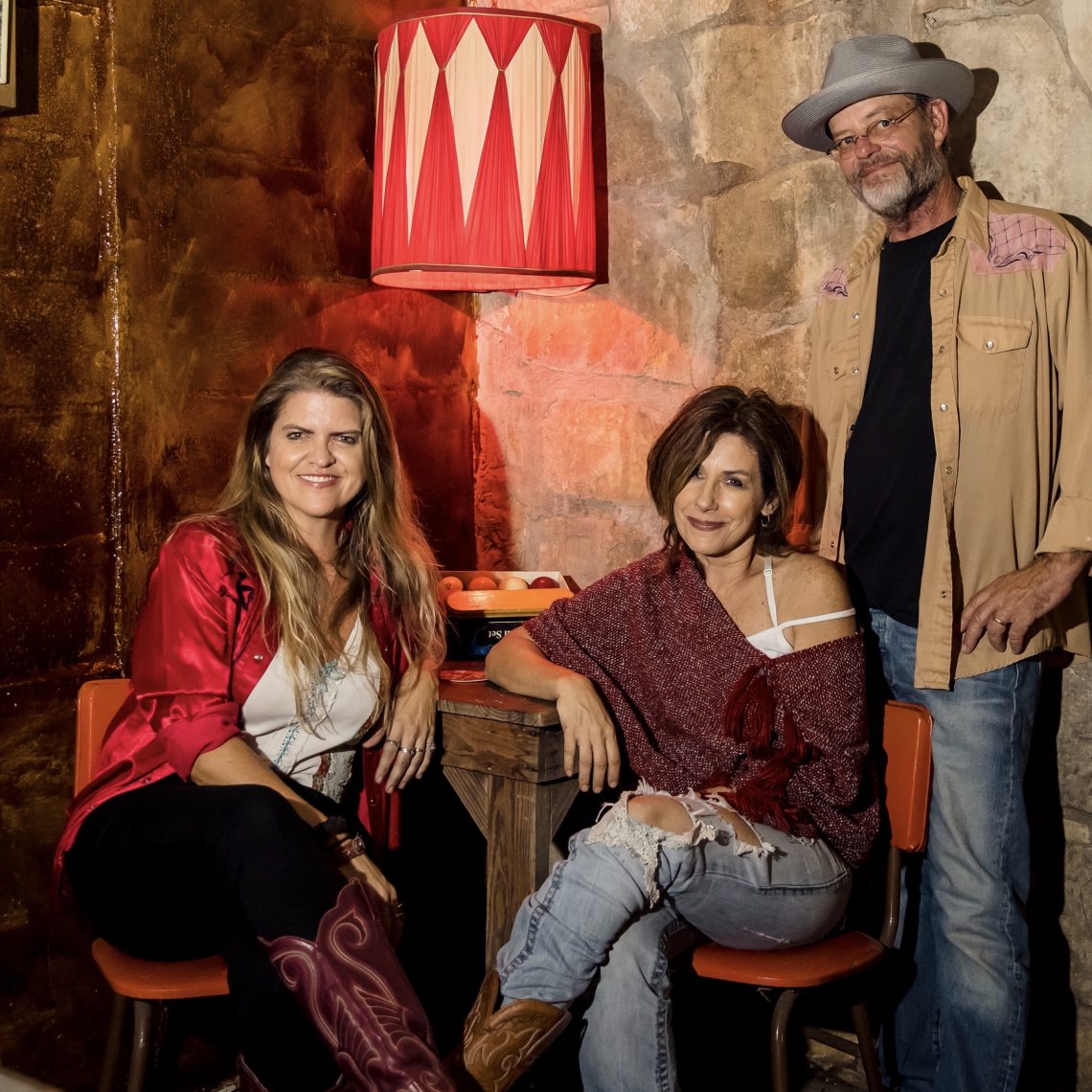

Proud of Sister Robyn, Lunchmeat, and Abby resurrecting this Texas Roadhouse!
Looking forward to more memorable times at the Devils Backbone Tavern!